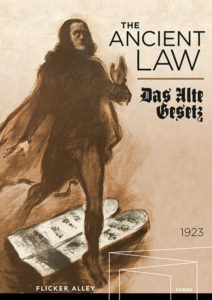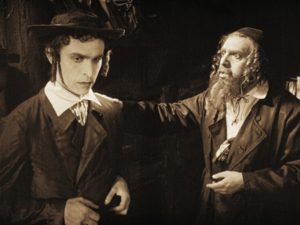The Ancient Law
Director: Ewald Andre Dupont 
Screenplay: Heinrich Laube and Paul Reno
Minutes: 135
Year: 1923
Score: 6.07
Release: Flicker Alley
I enjoyed this film, I say this because I may start dogging on it a bit but right out of the gates I want you to know that the movie itself it good. Just, bland and uneventful, but clearly from a different time.
From FlickerAlley.com:
Flicker Alley is proud to present Ewald André Dupont’s 1923 silent film The Ancient Law (Das alte Gesetz), digitally restored by the Deutsche Kinemathek with generous support from the Sunrise Foundation for Education and the Arts. The Ancient Law is an important piece of German-Jewish cinematic history, contrasting the closed world of an Eastern European shtetl with the liberal mores of 1860s Vienna. With its historically authentic set design and ensemble of prominent actors – all captured magnificently by cinematographer Theodor Sparkuhl – The Ancient Law is an outstanding example of the creativity of Jewish filmmakers in 1920s Germany.
After first reconstructing the film in 1984, the Deutsche Kinemathek found the censor’s certificate with the text of the original title cards. This provided the impetus for a worldwide search for all the surviving film elements and a new, digital restoration – which drew upon nitrate prints in five different languages held in archives across Europe and the United States. With the censor’s certificate, the restoration team from the Deutsche Kinemathek could accurately reconstruct the intertitles as well the correct editing. The color scheme is based on two nitrate prints nearly identical in their tinting and toning. The restored version closely corresponds to the original German theatrical release, both in its length and digitally simulated color.
In the film, Baruch (Ernst Deutsch), the son of a rabbi, becomes fascinated by the theater. Against his father’s wishes, Baruch leaves home and finds his way to Vienna, where an archduchess at the imperial court (Henny Porten) falls in love with him. She becomes his patroness, facilitating his successful career as a classical actor. But Baruch continues to long for home, and must find a way to reconcile his religious heritage with his love of secular literature. The movie paints a complex portrait of the tension between tradition and modernity.
First, and this goes without saying (but I say it none-the-less) because this movie was released by Flicker Alley I never once doubted the quality of the release. Aside from a little evidence of age this 95 year old German silent film looks spectacular and is an interesting look at Jewish Germans before the war. It is interesting to see Jewish culture and the passive racism that they faced, one of the intertitles says something along the line of, “Keep that Jew in the cast, I’ve never laughed so hard.” This was in response to Ernst Deutsch’s performance of Romeo, whose side locks fall from under his skull cap during the poisoning scene. Sehen Sie einen Juden, laugher abounds. It served its proper intent, both in my experience of the film and the effect is had on the character has he made decisions he felt necessary for his future.
 I struggle watching films which unfold like filmed stage-plays and The Ancient Law suffers from this. There are a few shots that exist to fill out the film a bit, for audiences at the time but none of that effected the story, so I was disconnected a few times.
I struggle watching films which unfold like filmed stage-plays and The Ancient Law suffers from this. There are a few shots that exist to fill out the film a bit, for audiences at the time but none of that effected the story, so I was disconnected a few times.
That said I love it when more examples of a genre become available, but if this was another moody 80s movie I probably would have turned it off pretty quick. That is why I wanted to make it known from the onset that this is good movie when qualified as a “cultural artifact”.
Like most of the Flicker Alley releases The Ancient Law comes stacked with interesting special features. The remnants of the the documentary show some very interesting behind the scenes images of film history, and how similar it is to today. There are two soundtracks, on typical and one a little abstract which, at times, doesn’t mesh well with the images.
Special Features:
- Der Film im Film (Germany, 1923) – The only surviving excerpt of a documentary on film production in Weimar Germany, featuring the different personalities of several famous directors of the era at work on the set including Fritz Lang, Robert Wiene, and E.A. Dupont.
- Insights into the Restoration – A 15-minute demonstration with raw scans of the different nitrate source materials, illustrating how the reconstruction was completed.
- Image Slideshow – Rare production stills and original archival materials.
- Essays on The Ancient Law – A booklet containing two essays: an appreciation of the film and its historical context, written by film historian and scholar, Cynthia Walk; and an overview of the restoration process by Daniel Meiller, Head of Audiovisual Collections, Deutsche Kinemathek.
- Notes on the Film Music – Introductions to the two new musical scores commissioned for the restored film.
Director: 6 – Cinematography: 8 – Edit: 4 – Parity: 1 – Main performance: 6 – Else performance: 4 – Score: 6 – Sound: NA – Story: 7 – Script: 7 – Effects: 5 – Design: 10 – Costumes: 10 – Keeps interest: 6 – Lasting: 5